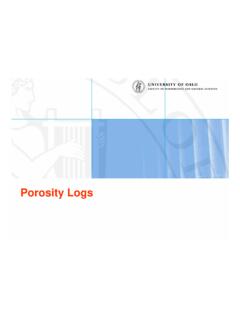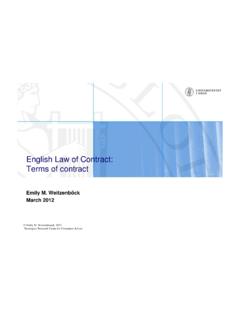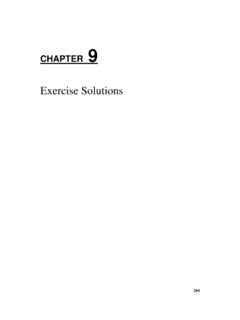Transcription of English Law of Contract: Consideration
1 Emily M. Weitzenboeck, 2012 Norwegian Research Center for Computers & LawEnglish Lawof Contract: ConsiderationEmily M. Weitzenb ckFebruary 2012 Emily M. Weitzenboeck, 2012 Norwegian Research Center for Computers & LawIntroduction Consideration is a fundamental prerequisite in English contract law Not present in Norwegian/Scandinavian contract law Nor (other) civil law systems Compare to Principles of European contract Law (1998), Article 2:101 Basic rule: A promise will not be enforceable unless it is supported by Consideration .
2 Main exception to this rule = promisesmade under (1) A common definition is in terms of the price of a promise, what one party must pay (not necessarily in financial terms) for promise of otherparty suchthat promise becomes legally binding ( gives rise to valid contract ). See Dunlop v. Selfridge(1915) In other words, for promise (offer) to be legally binding, it must seeksomething (or some action) in return. Promisee must show that they have bought the promise either (i) by doing some act in return for it, or (ii) by promising to do or refrain from doing some act in return for it.
3 A type of bargain principle (quid pro quo) is at work here. In case of (i), we talk of executed Consideration : Consideration consisting of performance of act prior to formationof contract (promise only becomes binding when Consideration has actually been executed, performed). This form of considerationtypically arises withunilateral contracts. In case of (ii), we talk of executory Consideration : Consideration consisting of promise, where something is to occurin future, after contract formed. This form of Consideration typicallyarises in bilateral contracts.
4 Emily M. Weitzenboeck, 2012 Norwegian Research Center for Computers & LawDefinition(2) Note: Consideration is traditionally needed not just for a new contract to be formed but also for making effective an agreement to vary or dischargean existing contract ; Consideration need not benefit promisor; it can consist simply of somedetriment to promisee or some benefit to third party: A valuable Consideration , in the sense of the law, may consist eitherin some right, interest, profit or benefit accruing to the one party, or some forbearance, detriment, loss or responsibility, given, suffered, or undertaken by the other.
5 (Lush J. in Currie v. Misa(1875) Consideration is to be distinguished from motiveor reason for contracting. Emily M. Weitzenboeck, 2012 Norwegian Research Center for Computers & LawBasic effect: Givesbargainsa legal privilege over gifts(gratutious promises). Emily M. Weitzenboeck, 2012 Norwegian Research Center for Computers & LawRationale(1) Several alternatives suggested over the years ..1. Consideration plays evidentiary and cautionary function. It corroboratesthe existence of promise and seriousness of promisor s intention to be Consideration embodies ideals of reciprocity, quid pro quo and Consideration explains appropriate measure of relief when promise is not fulfilled.)
6 It is essential for determining level of damages/compensationwhen due performance of promise fails to Consideration defines appropriate point at which law ought to step in to regulate social and economic relations in order to encourage usefuldealings between persons in situations otherwise characterised by lack of trust and Similar to 4, enforcement of bargain helps maximize social efficiencyand welfare. Emily M. Weitzenboeck, 2012 Norwegian Research Center for Computers & LawRationale(2) Patrick S. Atiyah Consideration : A Restatement , in Atiyah, Essays on contract (Oxford: Clarendon Press, 1986), p.
7 179 et seq. Atiyah views Consideration basically as the reason for enforcement of a promise , the reason being the justice of the case . For Atiyah, the whole process of intepreting contracts revolves aroundthe notion of fairness in exchange. The adequacy of Consideration playsan important role in this regard, If interpretation of terms of contract is difficult, amount of Consideration can be important factor in determining whatobligations the parties have assumed ;2. The implied condition in a contract ( Consideration given), and somerough notion that purchaser is entitled to receive adequate value for money.
8 The court does not expressly ask whether purchaser has received adequate value for money, but it does so If Consideration is grossly inadequate, this may give rise to strongsuspicion of fraud or undue influence which can justify courtsetting the contract aside. Emily M. Weitzenboeck, 2012 Norwegian Research Center for Computers & LawRequirementsfor considerationto be valid(1) A. Consideration must not be past Consideration must be given in return for (must be, to some extent, caused by) promise or act of other party, there must be fairly directco-relation between Consideration and promise/act.
9 Something only donefor reason other than promise will not be valid Consideration for promise. This requirement is often summed up by the (slightly misleading) expression Consideration must not be past . See, Roscorla v. Thomas(1842); Eastwood v. Kenyon(1840); R. v. Clark (1927). Decision in Eastwood v. Kenyonalso interesting because it highlightstension between Consideration and moral obligations. While husband hadmoralobligation to honour his promise, he did not have legal obligation(for want of Consideration ). Decision repudiated doctrine advanced by Lord Mansfield that Consideration was closely tied to moral obligationsand, in particular, that a pre-existing moral obligation furnishesconsideration for one s susequent promise to pay (a doctrine thatessentially dispenses with Consideration as a separate requirement).
10 Emily M. Weitzenboeck, 2012 Norwegian Research Center for Computers & LawRequirementsfor considerationto be valid(2) A. Consideration must not be past (cont.) Whether Consideration is past is a question of fact. Wording of agreementnot necessarily conclusive of issue. See Re McArdle(1951). Two exceptions to past Consideration rule:1. An act already performed may be valid Consideration for subsequentpromise if:a. Act done at promisor s request; andb. Parties understood at time that the act was to be compensated for; andc. The promise would have been legally enforceable had it beenmade prior to the act.










